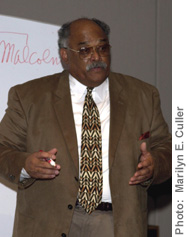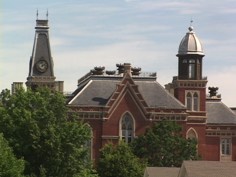Dr. King and Malcolm X: Comparing the Messengers
February 14, 2001
 February 14, 2001, Greencastle, Ind. - Two of the most compelling and influential speakers of the 20th century spoke of breaking down the barriers of race in very different styles, according to William H. Wiggins, Jr., professor of Afro-American studies and folklore at Indiana University and acting chair of IU's Department of Afro-American Studies. Wiggins spoke to a standing room only crowd at DePauw University's Watson Forum today as part of the University's observance of Black History Month.
February 14, 2001, Greencastle, Ind. - Two of the most compelling and influential speakers of the 20th century spoke of breaking down the barriers of race in very different styles, according to William H. Wiggins, Jr., professor of Afro-American studies and folklore at Indiana University and acting chair of IU's Department of Afro-American Studies. Wiggins spoke to a standing room only crowd at DePauw University's Watson Forum today as part of the University's observance of Black History Month.
In a speech entitled, "The Word and the Movement: A Comparative Look at the Preaching Styles of Martin Luther King, Jr. and Malcom X and the Impact of their Oratorical Styles on American Racism." Wiggins detailed the African American tradition of signifying, an oral contest played out on many street corners and other social arenas. It is a battle of wits and ability to think on one's feet, Wiggins says, as well as a test of character. "You can't cry or get upset at someone who may be quicker or funnier than you." Wiggins went on to explain how King and Malcolm X are steeped within the oral tradition with their quick and intellectual responses and reactions to the times in which they lived.
Wiggins discussed how Dr. Martin Luther King, Jr and Malcolm X both spoke on the theme of America and what it meant to be black at that time. The professor says King's speeches resembled sermons, while Malcolm was a street corner orator.  "King used metaphor, repetition and story telling to say that yeah we have problems but they are not insurmountable," Wiggins explained, "whereas Malcolm was not concerned with storytelling. He was a 'facts only' type of guy. His style
"King used metaphor, repetition and story telling to say that yeah we have problems but they are not insurmountable," Wiggins explained, "whereas Malcolm was not concerned with storytelling. He was a 'facts only' type of guy. His style
delivered the message that this is a nation by white people, for white people, and blacks must create their own nation in order to advance."
William Wiggins has authored the books Joe Louis: American Folk Hero"and O Freedom!: Afro-American Emancipation Celebrations. His fields of expertise include sports history and the Black Church.
